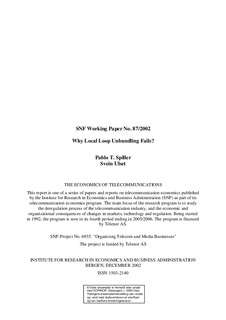| dc.description.abstract | The paper examines why local loop unbundling (LLU) mostly fails. Unbundling, in principle, makes the local loop (subscriber line) available to competing operators and enables the development of complementary network devices and services among a larger number of competing firms such as fast Internet access and IP telephony. Despite its popularity among regulators, however, local loop unbundling is still little used by operators in most countries. In the paper we set out to explain this paradox. We argue, based on a transaction cost cum strategic analysis of the parties’ incentives and the transactions involved, that regulatory enforced LLU contracts supported by regulated cost-based pricing, suffer both from infrastructure investment disincentives and inefficient contractual safeguards against the associated transaction hazards. The end result is intrusive regulation, which neither helps the new entrant nor provides much incentive for the incumbent to invest. | en |
